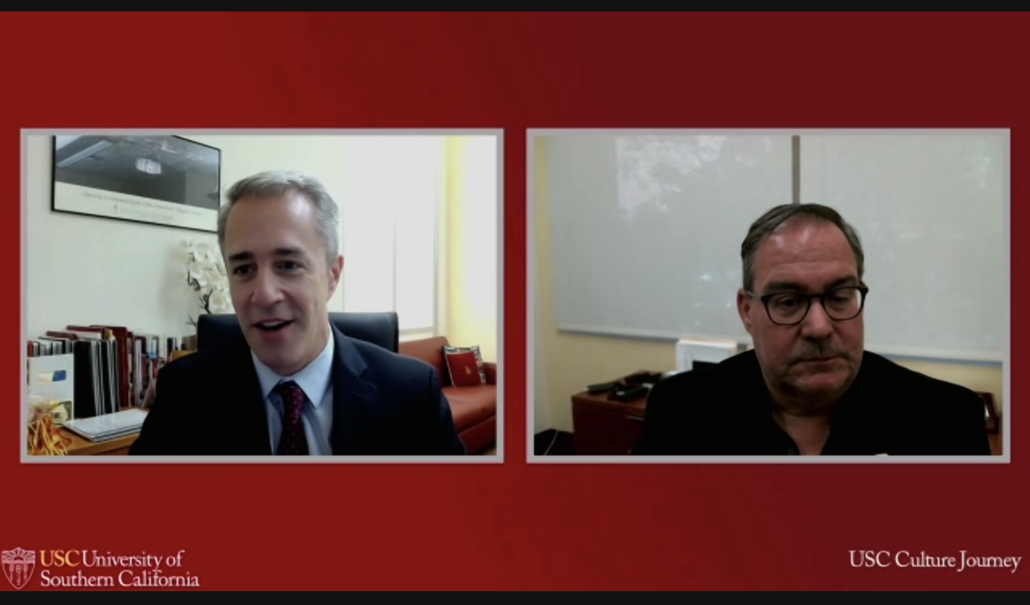Culture journey hosts discussion on veteran life

Carl A. Castro, director of the USC Center for Innovation and Research on Veterans and Military Families, discussed the transition veterans undergo from military to civilian life at a virtual event Wednesday. (Melissa Chen | Daily Trojan)
USC Culture Journey welcomed students, faculty and staff Wednesday for a conversation over Zoom with Carl A. Castro, director of the USC Center for Innovation and Research on Veterans and Military Families, about the transition from military to civilian life and shared experiences between veterans and non-veterans, such as the recent pandemic.
USC Culture Journey hosted the event in light of Veterans Day. Patrick Auerbach, associate senior vice president for Alumni Relations, began the event by introducing Castro, who joined the USC School of Social Work in 2013 after 33 years of military service where he obtained the rank of colonel. Castro started his military career as an infantryman and served in a variety of research and leadership positions, including director of the Military Operational Medicine Research Program. Castro also completed tours in Iraq and peacekeeping missions to Saudi Arabia, Bosnia and Kosovo.
His work includes more than 150 scientific articles and reports on topics such as veterans’ use of Telehealth and sexual victimization of LGBT military service members. His current research focuses on assessing the effects of combat operations on soldiers, family and unit readiness and evaluating the process of service members’ transition from military to civilian life.
Following Patrick Auerbach’s introduction to the colonel’s career, Castro shared more details with the audience about his research. Specifically, he identified the transition from military to civilian life as a troubling period for a significant minority of veterans and explores the best solutions to help veterans prepare for the transition while on active duty. To help non-veterans better comprehend the transition process for veterans, Castro said he often asks people to think about their own experiences with major changes like moving away from home.
“I always tell folks, ‘When you think about leaving the military, you have to think you’re moving to a new country,” Castro said.
For the rest of the event, Castro responded to questions submitted by participants via the Zoom question and answer, some of which were specific to the military and veteran experience and others pertaining to transitions regular citizens also grapple with.
Castro explained three main phases of the transition process: preparing, transitioning and evaluating and making adjustments. In the preparation stage, veterans create plans for goals such as acquiring a job and housing. Plans vary for each veteran, Castro said, as some may wish to take time off after years of military service.
Prompted by the audience, Castro discussed the different transitions veterans have depending on their length of service. According to Castro, junior enlisted service members with relatively little financial preparation and resources, and veterans who are neither of senior or junior status, tend to have more difficult times transitioning after serving.
“If you’re a major lieutenant colonel and retired from the military, believe it or not, they have a much more difficult time transitioning because they’re not senior enough like the generals and admirals to get these lucrative CEO or vice president jobs, but they’re too senior for more entry level training jobs,” Castro said. “That makes their transitions more challenging in the sense of leaving the military and getting a civilian job commensurate with their experience and skills that they have.”
Castro also discussed the service members’ experiences with dishonorable discharges and clarified that service members who are discharged dishonorably are not considered veterans in the common United States definition of the term, which encompasses those who have served on active duty for at least two years, honorably. Specific organizations and other countries have their own definitions of veterans, which can shape the experience of service members and their available support.
Moving to more general transitions, Castro offered strategies for challenging transitions in the lives of non-veterans. He emphasised a positive attitude, highlighting its relevance with the ongoing changes at USC during the coronavirus pandemic, which some participants mentioned attempting to manage.
If you come in with a positive attitude — maybe [your situation is] not what you want, but you’re gonna make the best of it until things improve,” Castro said.

